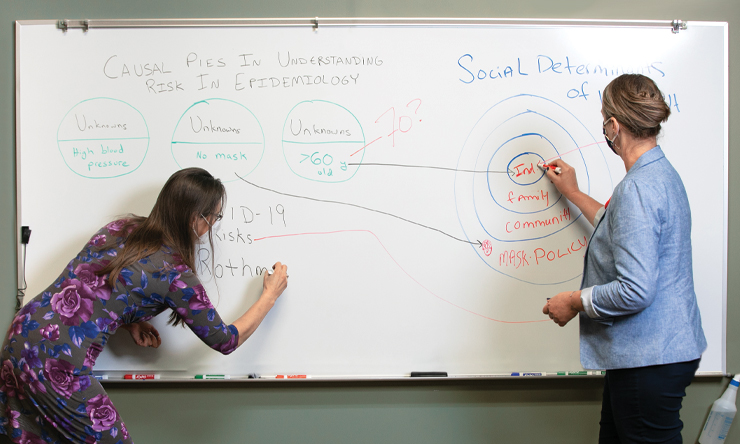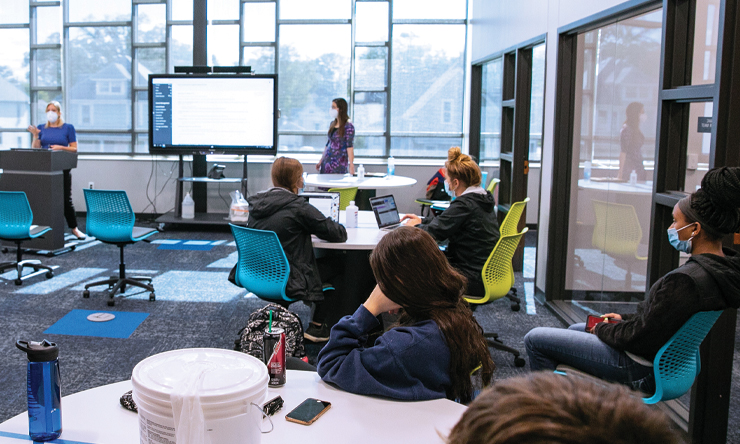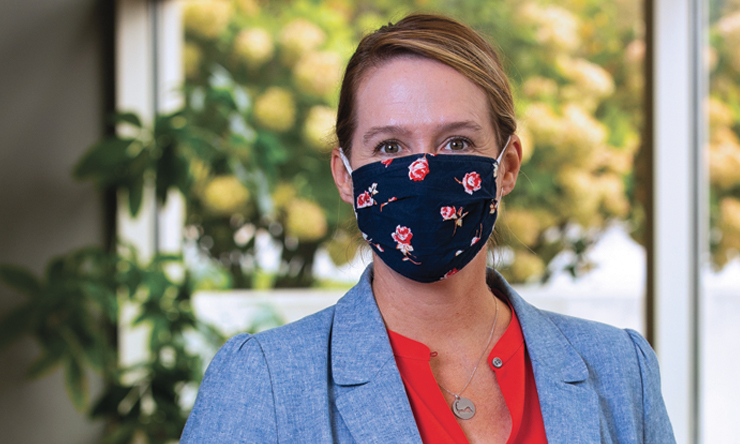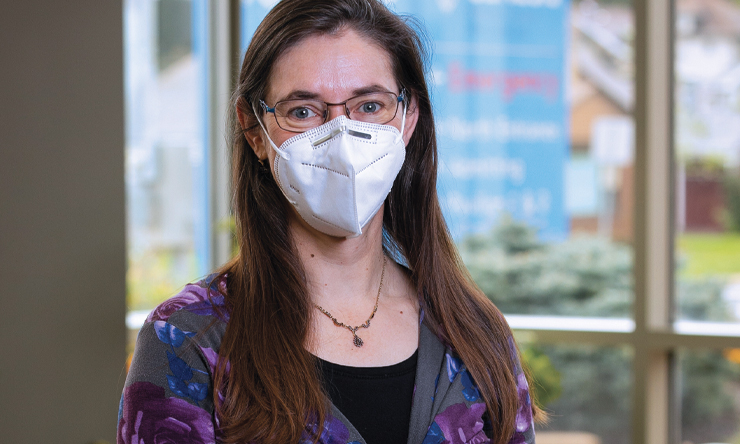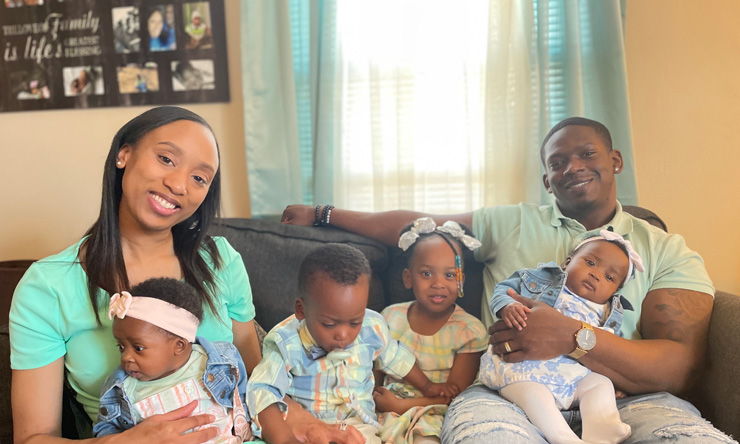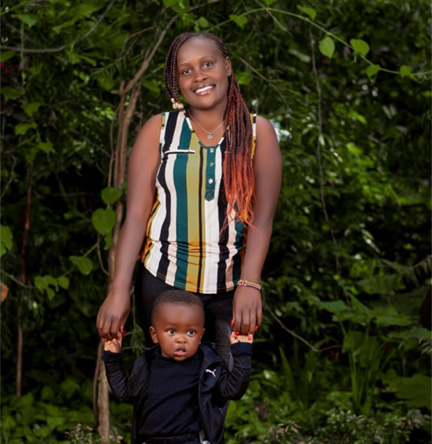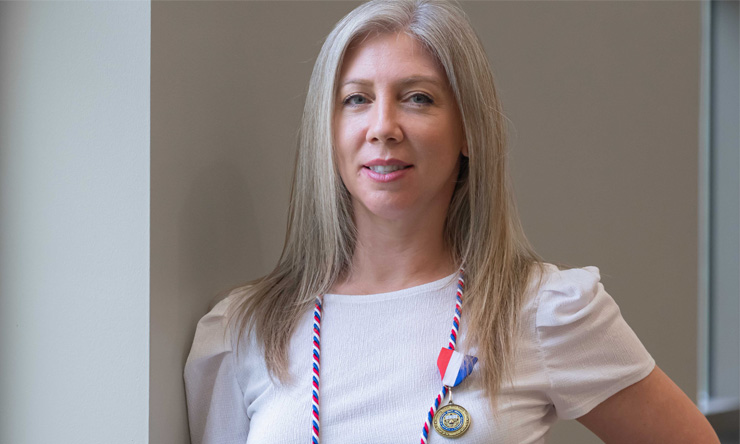As an experienced epidemiologist, Colleen Doak, PhD, recognized the immense value a St. Ambrose University Master of Public Health degree program brought to her native Quad Cities. That's why she eagerly joined the faculty of the new and fully online MPH program as an assistant professor in 2019.
Doak also understood, though, why folks outside the health care industry were a little less clear on the broad concept of public health.
"It might have been hard for somebody even inside the university to see what the applications for such a degree could be," she said. "I think we all have a better understanding now."
No doubt. In 2020, the entire world has endured a textbook lesson in the deadly and far-reaching harm a previously unknown and highly infectious virus can inflict. Consequently, a new appreciation has grown – across the globe and at St. Ambrose – for the essential ways highly educated public health experts can create practices, protocols and systems for mitigating and containing the spread of a dangerously infectious disease.
At St. Ambrose, Doak and MPH Professor and Program Chair Melissa Sharer, PhD, played critical roles in helping the university ensure the safety of the campus community while also lending expertise to the planning and execution of a complex process to bring students back to school this fall. They also were pivotal to a safety-first decision to move back to online education two weeks earlier than intended when the COVID-19 cases spiked in November.
"We really relied on their expertise to provide the gold standard guidelines and advice for moving forward," said Dean of Students Christopher Waugh, PhD, who co-chaired a 13-member Implementation Team along with College of Health and Human Services Associate Dean Lynn Kilburg, '91, '01 MBA, DHSc.
"Melissa and Colleen have impacted everything," Waugh added. "One of the things that is probably most unsung is their willingness to answer individual questions as they have surfaced. They've also been instrumental in helping us with modeling out physical spaces."
Like colleges and universities around the world, St. Ambrose has relied on departmental skills from across the campus to ensure students are receiving the best educational and college experiences possible while also keeping the entire campus community safe under extremely challenging conditions.
- The Physical Plant worked tirelessly to accommodate physical distancing in campus facilities and to keep cleaning and disinfecting materials in steady supply.
- The Registrar's Office created multiple course schedules to find the right balance between the face-to-face learning students desired and the virtual learning safe practices required.
- The Center for Instructional Design and Technology and the Information Technology Office stepped up to fulfill technical needs for virtual learning and hybrid courses.
- The Human Resources Office introduced an online link to monitor the daily health of students and employees and ensure those who might have had the virus were tested and, as necessary, quarantined or isolated.
- Student Services, Residence Life, Health Services, Food Services, the Counseling Center and Campus Ministry tended to the needs of quarantined or recovering students.
- Coaches and trainers in the Athletics Office worked overtime to monitor the health of athletes and provide safe opportunities to practice and compete.
- The Communications and Marketing Office created the Bee Safe, Bee Responsible Promise, and directed important messaging, outreach and prompt responses to all COVID-related issues and questions.
- And, of course, faculty went above and beyond to adjust teaching practices and methods to meet the challenges of the moment.
Few universities have better and more committed people. Fewer still could rely on the knowledge and vision of public health faculty experts to guide them through the COVID-19 pandemic.
Expertise and Guidance
Faculty in the MPH program – such as Drs. Doak and Sharer (pictured) – have helped the campus and QCA through the year of COVID19.
From the time the pandemic was declared, the MPH team – which includes adjunct professor John Bowser '02, PhD, and program coordinator Kate Horberg – prepared weekly situation reports that broke down regional COVID-19 conditions in detail and alerted the wider community to increases or decreases in local cases and deaths owed to the virus. These helped Waugh, Kilburg, the Implementation Team, and university leaders be pro-active and reactive, first in re-opening for fall and then in addressing challenges that arose through the semester.
With considerable help from College of Health and Human Services Dean and Vice President for Strategic Initiatives Sandra Cassady PT, PhD, Human Resources Director Audrey Blair, and Health Services Director Nancy Hines, RN, the MPH team also arranged partnerships with Community Health Services in Davenport and the Test Iowa College program to ensure ready and free-of-charge testing for the virus was available to all students and employees.
"The ready availability of the MPH Department's skills and knowledge in the midst of a global pandemic has been a blessing to me and the Cabinet as we make decisions that impact the health and wellbeing of our St. Ambrose community," said Sister Joan Lescinski, CSJ, PhD, president of the university. "It has added an empowering element of confidence to our choices."
Sharer was a critical member of a Task Force that created a 74-page report outlining safe options for the fall semester re-opening and also served on the Implementation Team as the Task Force's recommendations were enacted over summer. That's a role Doak assumed once the school year began. Sharer described as "pure public health" the interdepartmental connectedness of members of both working groups.
"We all came together to work to solve a problem," she said. "This aligns with one of our key competencies for MPH accreditation: perform effectively on interprofessional teams. If that isn't a description of the Implementation Team's work, I don't know what is."
Neither Cassady nor SAU Trustee Tom Higgins '67 foresaw this specific pandemic challenge when they conceived of an MPH degree as a complementary addition to the Higgins-funded Institute for Person-Centered Care at St. Ambrose when both were launched in 2018. They did, though, see a need for graduate-level public health education in the region.
"Through my work with regional health systems and collaboration with the directors of the Scott and Rock County Health Departments, I knew the importance of public health perspectives and the skills public health professionals bring to community and population health initiatives," Cassady said. "It made good sense to bring that expertise to the Quad Cities. MPH graduates are positioned to lead the changes needed for a healthy community."
The fully online St. Ambrose MPH program has grown slowly but interest definitely increased as the pandemic pushed public health leaders such as Anthony Fauci, MD, and Deborah Birx, MD, into the national spotlight.
The ready availability of the MPH Department's skills and knowledge in the midst of a global pandemic has been a blessing to me and the Cabinet as we make decisions that impact the health and wellbeing of our St. Ambrose community.
Sister Joan Lescinski, CSJ, PhD
Locally, experts such Louis Katz, MD, and county Health Department Directors Edward Rivers and Nita Ludwig became go-to sources for information and direction.
"I appreciate the opportunity to work with St. Ambrose University and to provide guidance as they have navigated COVID-19 with 3,600 faculty, staff, and students," said Dr. Katz.
Doak said public understanding of the need for healthy health care systems, and the role education can play in advancing that mission, have grown exponentially, too.
"People are thinking differently," Doak said. "There is now an awareness of what can be done with a public health degree."
Cassady said that extends to people in the health and social welfare professions.
"The MPH is a great graduate degree or an added credential to someone in the medical, health or human services fields," she said. "St. Ambrose also offers dual degrees in public health and the Master of Social Work and a microcredential in Epidemiology."
The latter is gaining interest in terms of both enrollment and engagement, Doak said.
"I have never had students engaged at the level they are in my Epidemiology class," she said. "I have been teaching Epidemiology for 15 years and, every single year, students say, 'What is a rate?' and 'Why do we care about the rate?' And, honestly, until now, it was hard to explain it to them. But, now, when I'm explaining the rates, I say it's 'flattening the curve,' and everybody knows what that means.
"There is an awesome awareness of the value of a degree in public health," she said.
There is also a growing awareness among undergraduate students, one that could make the MPH an attractive plus-one option for students interested in health care careers.
Higgins said a St. Ambrose undergraduate foundation would make any MPH degree holder even more formidable in their field.
"St. Ambrose has a real advantage in my opinion because good public health practice is about more than technical proficiencies," he said. "It is a really well-rounded approach. It brings in aspects of social work, the humanities and, I would argue, a spiritual component as well. Good public health, good wellbeing, really depends on bringing all of those things to bear.
"So for St. Ambrose to have a strong MPH program just makes all the sense in the world. It really fits."
–Craig DeVrieze '16 MOL
You Might Also Be Interested In...
Share This Story

